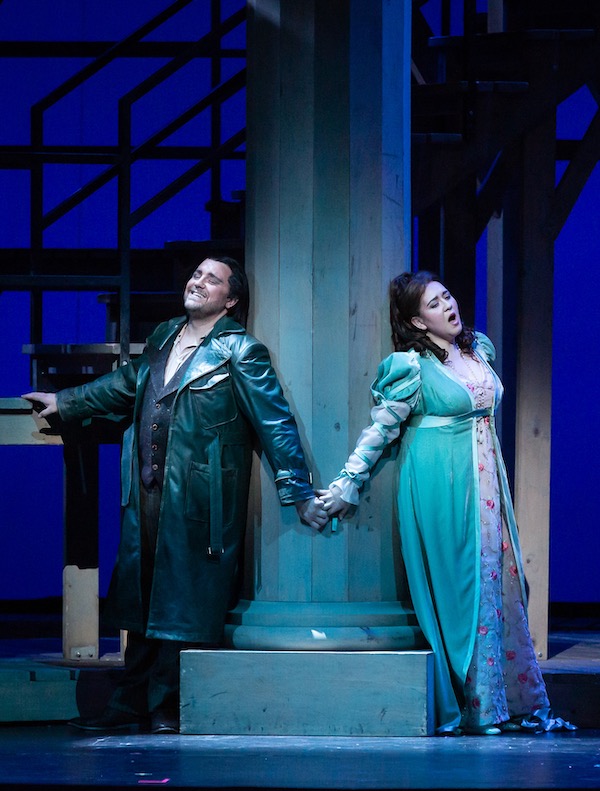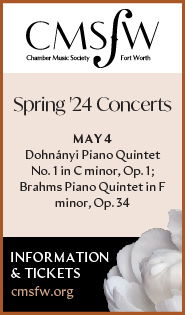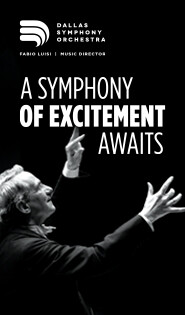Full-blooded vocalism wins out over uneven staging in HGO’s “Romeo et Juliette”

One might nearly have thought Romeo and Juliet had absconded into the realm of Italian verismo. Tenor Michael Spyres and soprano Adriana González, portraying Shakespeare’s star-crossed lovers, sang at times Friday with a fire and red-bloodedness that would’ve suited Pagliacci.
No, this Romeo et Juliette was Charles Gounod’s, receiving its first Houston Grand Opera staging since 2005. But the young singers’ abandon fit right in. Don’t Gounod’s Romeo and Italian verismo both unite stories of hot-blooded passion with scores replete with big tunes?
Nevertheless, Gallic refinement still had a place in Friday’s performance at Wortham Theater Center, thanks notably to Spyres’ Romeo.
The gleam and finesse of his vocalism brought out the poetry in Gounod’s music, especially in the Act 1 madrigal with Juliet and the Balcony Scene. Spyres had a knack for illuminating details throughout: When Romeo’s aria, “Ah! Leve-toi, soleil,” likened Juliet to a pure, charming star, Spyres caressed the word “charmant,” showing that even French consonants can sound mellifluous.
As Romeo’s passions swelled, so did Spyres’ ringing tones. And when the Capulet vs. Montague conflict erupted in the Act III street fight, Spyres’ voice gained a brilliance it had hardly hinted at until then. The scene’s climax—where Spyres threw in an unwritten high C—supplied the tragic tale’s first dose of visceral impact. As the merciless events made Romeo increasingly desperate, Spyres’ singing gained even more heft.
González boasted impressive power as well. She brought Juliet a fuller, warmer voice than many sopranos do. Juliet’s waltz didn’t sparkle the way it does with lighter, nimbler voices—and the grace notes that lend the tune airiness didn’t even register. But her vocal richness hinted that this Juliet was, emotionally, no child.
When Juliet learned that Romeo belonged to the enemy clan, the shadow that fell over González’s voice supplied the music’s first tinge of impending tragedy. But Juliet’s lyrical outpourings blossomed; the occasional stratospheric pianissimo added a fresh shading to the poetry. And in the climactic “potion” aria, González’s voice surged anew, capturing Juliet’s passion and fearlessness with such immediacy that she gained heroic stature.
The rest of the cast framed the ill-fate pair adroitly.
Baritone Thomas Glass, the exuberant Papageno of HGO’s February production of The Magic Flute, cut just as lively a figure as Romeo’s sidekick Mercutio. His mellow voice mirrored his smiling demeanor, and Glass dispatched the Queen Mab ballad with an engaging buoyancy—thanks in part to a tempo that was a touch less driven than it often is.
As Capulet, Juliet’s father, baritone Donnie Ray Albert represented a piece of HGO history: He had played Porgy in the company’s 1976 production of Gershwin’s Porgy and Bess, which proceeded to Broadway and won a Tony award.
Friday, his voice’s resonance and vigor nearly belied the passing of time. Albert dispatched Capulet’s party aria lustily, and when Capulet demanded that Juliet go through with the marriage that was planned for her, Albert’s sturdy singing embodied all the weight of family obligation.
Mezzo-soprano Emily Treigle—granddaughter of the great bass-baritone Norman Treigle—contributed hearty singing that brought out the earthy side of Juliet’s nurse, Gertrude. Bass Nicholas Newton’s genial bearing played up Friar Laurence’s affection for Juliet, and the dignity of the friar’s music came across through Newton’s generous tones. Tenor Carlos Enrique Santelli, a lively Pong in HGO’s concurrent staging of Puccini’s Turandot, sounded strained at times as Juliet’s fiery cousin Tybalt.
Mezzo-soprano Sun-Ly Pierce treated the trouser role of Stephano, one of Romeo’s pals, to a lustrous voice and breezy demeanor. Stephano’s aria taunting the Capulets was all but lost, though, amid the bustle of director Tomer Zvulun’s contemporary staging.
Zvulun lays out the story’s essential action vividly—in moments such as the Capulet family surrounding the beleaguered Juliet at the end of Act 1, or Romeo and Juliet reaching out and finally touching in the Balcony Scene. But the staging surrounds that with other activity that pulls attention away from the principals.
The Act 1 partygoers act out a bit of A Midsummer Night’s Dream, and in Act 3—during Stephano’s aria—Mercutio and his buddies play out the same play’s Pyramus and Thisbe bit, an allusion to family animosity. Since Stephano’s aria itself hints at the rivalry, the extra action not only detracts from it, but amounts to a director trying too hard to show how clever he is. Why are Mercutio and company doing Shakespeare in the street, anyway?
Dancers and other party antics all but engulf Glass’s performance of the Queen Mab aria. And the staging resorts to elephantine symbolism in the form of an angel of death that appears as Juliet first senses doom. It reappears at obvious moments, then two more angels of death join in for the Tomb Scene.
Fight director Adam Noble mobilized the youthful cast for an unusually effective Mercutio-Tybalt-Romeo brawl—a knife fight capped off by a gunshot. Gregory Gale’s costumes set a more or less modern-day time period, which John Conklin’s simple set, alluding to Shakespeare’s own Globe Theatre, leaves room for.
In the midst of all this, conductor Patrick Summers and the HGO Orchestra put Gounod’s musical storytelling in the forefront Friday. Before the Balcony Scene, the strings’ glistening tone conjured up the idyllic nighttime. The orchestra’s gentleness complemented Romeo and Juliet’s lyricism, and its power propelled the fight scene’s ferocity.
The HGO Chorus laid the groundwork for the whole story through the starkness and hints of gentleness it gave the Prologue, and the ensemble’s full-throated singing redoubled the fight scene’s wallop. Thanks to Conklin’s set, with its multiple levels, the group had a much more sonically advantageous position than it does in the concurrent Turandot. What a difference that makes.
Romeo et Juliette runs through May 11 at Wortham Theater Center. houstongrandopera.org


